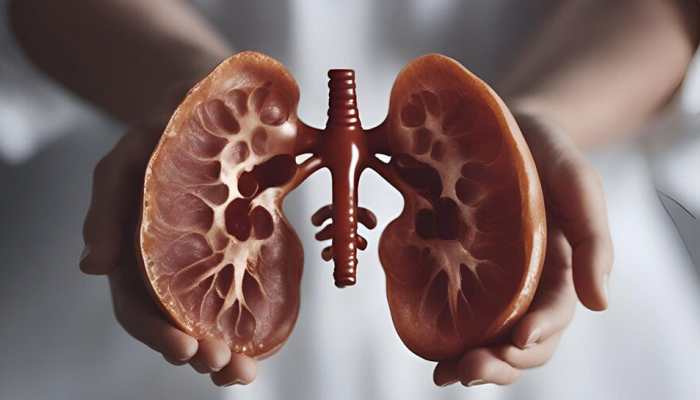Role Of Nutrition And Lifestyle In Kidney Health: Reduce Salt Intake To Quit Smoking - Key Pointers
Kidney Health Tips: When CKD goes undetected and is not treated appropriately, the condition progresses to end-stage renal disease (ESRD), necessitating dialysis or a kidney transplant.
Trending Photos
) Pic Courtesy: Freepik For Representational Use Only
Pic Courtesy: Freepik For Representational Use OnlyKidneys play an essential role in body’s waste filtration, through which they balance fluids while managing blood pressure and generating essential hormones. Chronic Kidney Disease (CKD) functions as a ‘silent killer’, since it’s initial development causes no detectable symptoms, but the condition continues to degrade kidney functionality. Significant kidney damage happens before symptoms of fatigue and facial or lower body swelling, along with nighttime urination and foamy urine, become evident. When CKD goes undetected and is not treated appropriately, the condition progresses to end-stage renal disease (ESRD), necessitating dialysis or a kidney transplant.
According to researchers, the worldwide population of individuals with CKD currently surpasses 850 million and is projected to become the fifth leading cause of death by the year 2040. Dr Mukteshwar Rajak, MBBS, MD(Medicine), DM(Nephrology), Consultant Nephrologist (NephroPlus) shares his insights on how to maintain good kidney health:
The Growing Burden of Kidney Disease
According to recent reports, kidney disease is an increasing global problem that disproportionately affects poor, vulnerable, and marginalized populations and is associated with high individual, health care, and societal costs. Approximately 700 million people are estimated to have CKD worldwide. Therefore, it’s time to spotlight a growing global concern: kidney disease, and how nutrition and lifestyle choices are at the heart of both prevention and management.
Nutrition: The First Step of Defense
Food serves a purpose beyond providing energy; therefore, a diet designed for patients with kidney ailments enables disease progression control and helps minimize health complications while leading to improved medical results.
1. Reduce Salt Intake
High blood pressure develops because of excessive sodium intake, which functions as an important risk factor in kidney damage. It is advised that an individual should not consume more than 5 grams of sodium per day. The recommended daily sodium intake is below 5 grams, which implies reducing the intake of processed foods as well as pickles, chips, and table salt in excess amounts.
2. Control Protein Portions
Despite their importance to the body, proteins should never exceed recommended amounts, and red meat consumption in particular puts extra stress on the kidney systems. To manage kidney disease effectively, patients should follow a low-protein diet that includes plant proteins like lentils and tofu together with nuts.
3. Manage consumption of phosphorus and potassium
The management of phosphorus in dairy and colas and potassium in bananas along with potatoes and spinach becomes crucial for those in advanced kidney disease stages.
4. Hydration is necessary
Water consumption at proper levels serves to remove toxic substances from the body. Patients with kidney ailments should observe their fluid consumption since it requires proper regulation for kidney safety. The amount of hydration must match each person’s specific kidney condition.
Lifestyle Habits that Safeguard Kidney Health
The combination of selected lifestyle decisions helps decrease the chances of kidney damage and minimizes disease progression for patients who already have it.
1. Regular Physical Activity
An inactive lifestyle results in obesity, which, together with diabetes and hypertension, remains a primary factor that harms the kidneys. Adding 30 minutes of medium-level physical exercises, including walking at a brisk pace along with cycling or practicing yoga, will improve your renal functions moderately.
2. Quit Smoking and Limit Alcohol
Blood circulation to the kidneys diminishes when a person smokes, thus worsening kidney damage, while drinking alcohol in excess leads to imbalances in body fluids and electrolytes. The global health initiative of World Health Day 2024 promotes smoking cessation initiatives together with moderate alcohol consumption as essential public health approaches.
3. Individuals should maintain proper control over their blood sugar levels and blood pressure readings
Diabetes and hypertension account for over 60% of all CKD cases. The prevention of additional kidney damage depends on both medical supervision with patient adherence and continuous health management.
4. Avoid Overuse of Painkillers
The long-term use of ibuprofen together with other NSAID medications purchased over the counter can cause extensive damage to kidney function.
Maintaining kidney health can be greatly influenced by nutrition and lifestyle adjustments. By choosing a well-rounded diet that is low in sodium and minimally processed foods, alongside regular physical activity and preventive health screenings, individuals can markedly lower their chances of developing CKD. This holistic approach not only enhances individual well-being but also alleviates the global burden posed by kidney diseases, an investment in a healthier future for everyone.
Stay informed on all the latest news, real-time breaking news updates, and follow all the important headlines in india news andworld News on Zee News.
Live Tv



)
)
)
)
)
)
)
)
)
)
)
)
)
)
